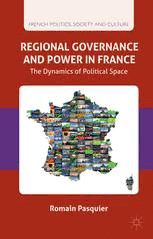
Regional Governance and Power in France: The Dynamics of Political Space PDF
Preview Regional Governance and Power in France: The Dynamics of Political Space
Regional Governance and Power in France FrenchPolitics,SocietyandCulture GeneralEditor:JocelynEvans,ProfessorofPolitics,UniversityofLeeds,UK. Francehasalwaysfascinatedoutsideobservers.Nowthecountryisundergoingaperiodofprofound transformation.FranceisfacedwitharapidlychanginginternationalandEuropeanenvironment anditishavingtorethinksomeofitsmostbasicsocial,politicalandeconomicorthodoxies.Aselse- where,thereispressuretoconform.Andyet,whileFranceisrespondinginwaysthatarenodoubt familiartopeopleinotherEuropeancountries,itisalsomanagingtomaintainelementsofitslong- standingdistinctiveness.Overall,itremainsaplacethatisnotexactlycommelesautres. ThisnewseriesexaminesallaspectsofFrenchpolitics,societyandculture.Insodoingitfocuseson thechangingnatureoftheFrenchsystemaswellastheestablishedpatternsofpolitical,socialand culturallife.Contributorstotheseriesareencouragedtopresentnewandinnovativearguments sothattheinformedreadercanlearnandunderstandmoreaboutoneofthemostbeguilingand compellingofallEuropeancountries. Titlesinclude: DavidS.Bell,JohnGaffney(editors) THEPRESIDENTSOFTHEFRENCHFIFTHREPUBLIC JocelynEvans,GillesIvaldi THE2012FRENCHPRESIDENTIALELECTIONS TheInevitableAlternative JohnGaffney POLITICALLEADERSHIPINFRANCE FromCharlesdeGaulletoNicolasSarkozy ImogenLong WOMENINTELLECTUALSINPOST-68FRANCE PetitionsandPolemics GinoG.Raymond(editor) THESARKOZYPRESIDENCY BreakingtheMould? DavidS.BellandByronCriddle EXCEPTIONALSOCIALISTS TheCaseoftheFrenchSocialistParty JeremyAhearne GOVERNMENTTHROUGHCULTUREANDTHECONTEMPORARYFRENCHRIGHT RomainPasquier REGIONALGOVERNANCEANDPOWERINFRANCE TheDynamicsofPoliticalSpace FrenchPolitics,SocietyandCulture SeriesStandingOrderISBN978–0–333–80440–7hardcover SeriesStandingOrderISBN978–0–333–80441–4paperback (outsideNorthAmericaonly) Youcanreceivefuturetitlesinthisseriesastheyarepublishedbyplacingastandingorder.Please contactyourbookselleror,incaseofdifficulty,writetousattheaddressbelowwithyournameand address,thetitleoftheseriesandtheISBNsquotedabove. CustomerServicesDepartment,MacmillanDistributionLtd,Houndmills,Basingstoke,Hampshire RG216XS,England Regional Governance and Power in France The Dynamics of Political Space Romain Pasquier ProfessorandDirectorofResearch,Centrederecherchessurl’actionpolitiqueenEurope (CRAPE),SciencesPoRennes,France ©RomainPasquier2015 Softcover reprint of the hardcover 1st edition 2015 978-1-137-48445-1 Allrightsreserved.Noreproduction,copyortransmissionofthis publicationmaybemadewithoutwrittenpermission. Noportionofthispublicationmaybereproduced,copiedortransmitted savewithwrittenpermissionorinaccordancewiththeprovisionsofthe Copyright,DesignsandPatentsAct1988,orunderthetermsofanylicence permittinglimitedcopyingissuedbytheCopyrightLicensingAgency, SaffronHouse,6–10KirbyStreet,LondonEC1N8TS. Anypersonwhodoesanyunauthorizedactinrelationtothispublication maybeliabletocriminalprosecutionandcivilclaimsfordamages. Theauthorhasassertedhisrighttobeidentifiedastheauthorofthiswork inaccordancewiththeCopyright,DesignsandPatentsAct1988. Firstpublished2015by PALGRAVEMACMILLAN PalgraveMacmillanintheUKisanimprintofMacmillanPublishersLimited, registeredinEngland,companynumber785998,ofHoundmills,Basingstoke, HampshireRG216XS. PalgraveMacmillanintheUSisadivisionofStMartin’sPressLLC, 175FifthAvenue,NewYork,NY10010. PalgraveMacmillanistheglobalacademicimprintoftheabovecompanies andhascompaniesandrepresentativesthroughouttheworld. Palgrave®andMacmillan®areregisteredtrademarksintheUnitedStates, theUnitedKingdom,Europeandothercountries. ISBN 978-1-349-50349-0 ISBN 978-1-137-48446-8 (eBook) DOI 10.1057/9781137484468 Thisbookisprintedonpapersuitableforrecyclingandmadefromfully managedandsustainedforestsources.Logging,pulpingandmanufacturing processesareexpectedtoconformtotheenvironmentalregulationsofthe countryoforigin. AcataloguerecordforthisbookisavailablefromtheBritishLibrary. AcatalogrecordforthisbookisavailablefromtheLibraryofCongress. Contents ListofIllustrations vii Introduction:RegionsandtheDynamicsofPoliticalSpace 1 Socialsciencesandtheregion 2 Theregionasaunitofanalysisofpoliticalchange 7 Spaceandregionalpower 10 Part I TheRegionasaSpaceofMobilisation 1 RegionalismandtheConstructionofIdentity 19 Therepublicannarrativeorthedenialofdistinctive identities 20 Thereinventionoftheregions 26 Differentiatingidentityinregionalspace 34 2 RegionalismandPoliticalCompetition 39 Conservativeregionalismandtherepublicanproject 39 Regionalismasminoritynationalism 43 RegionalismintheFrenchlocalpoliticalsystem 49 Part II TheRegionasFunctionalSpace 3 RegionalisationandPoliciesofTerritorialJustice 61 Centralismandregionaleconomicdevelopment 62 Territorialplanninganddevelopment,andtheFrench approachtoregionalisation 69 TheEuropeanUnionandthechangingscaleofterritorial justice 80 4 RegionalisationandTerritorialStateReforms 86 Theregionanddecentralisation 87 Regionalresourcesandstatus 96 Lookingbothways:Theregionaspoliticaland administrativeentity 110 Part III TheRegionasSpaceofGovernance 5 RegionsandEuropeanGovernance 123 Europeanintegration,regionalgovernanceandeffects ofscale 124 v vi Contents Europeannormsandregionalisationofpublicpolicy 128 Proactiveregionalstrategies 136 6 RegionsandTerritorialGovernance 146 Regionalpowerandthemanagementofinterdependence 146 Regionalpowerandthetutelaryfigureofthestate 163 Conclusion:RegionalPowerandTerritorialDifferentiation 172 Theparametersofterritorialpolicychange 172 Regionalpowerandmodelsofgovernance 176 AFranceofdifferences 182 Notes 184 Bibliography 202 Index 217 Illustrations Figures I.1 Exogenouspoliticalchange:Theregionasanobjectof research 8 I.2 Endogenouspoliticalchange:Theregionassubjectof research 9 Maps 1.1 Mapoftheadministrativeandtaxdistrictsin seventeenthcenturyFrance 23 3.1 Clémentel’sproposedregions(1917) 64 3.2 The21regionsofFranceinthe1956–1970programme 74 4.1 Proposalsforanewregionalmap(25July2014) 89 Tables I.1 Typesofregionalism 12 I.2 Typesofregionalisation 13 I.3 Theparametersofregionalpower 15 1.1 The‘Moreno’identityscalein14regionsofEurope(2009) 37 2.1 Theregionalist/nationalistvoteinBrittanyandCorsicaat theregionalelections(1986–2010) 53 4.1 BudgetsofFrenchregions(1993–2009) 99 4.2 Divisionofareasofresponsibilitybetweenlocal authoritiesandthestate(2012) 104 6.1 ItemisedFrenchregionalbudget(2009) 148 6.2 Citizens’expectationsofregionalisation 168 6.3 Economicandinterregionalsolidarity 169 C.1 Typologyofregionalpower 181 vii Introduction: Regions and the Dynamics of Political Space At the end of the 1990s the decline of the old European nation-state seemedinexorable.BertrandBadie(1995)proclaimedtheendofterrito- ries;or,ratherthecrisisofterritorywithintheconstructionofthestate. MichaelKeating(1998)announcedtheemergenceofanewregionalism inwesternEuropeattheintersectionofdecentralisation,Europeaninte- gration and economic globalisation. So where are we today, at the beginning of the twenty-first century? Processes of decentralisation, devolution and federalisation are being pursued almost everywhere. A number of indicators even point to a hardening of relationships in Europe between the centre and the periphery. Belgium seems to be locked into linguistic guerrilla warfare between the Flemish and the Walloons, the outcome of which directly challenges the institutional futureofthecountry.InSpain,asymbolicreferendumhas,forthefirst time,broughttheindependenceofCataloniaintothelimelight1 Inthe UK in 2007, Alex Salmond became the first nationalist to head up the autonomousScottishgovernment,withthestatedintentionofleading his nation towards independence. In Italy the Northern League took political control of two important Italian regions in 2010: Veneto and Piedmont. Nor has France escaped similar tensions. In the autumn of 2013, a vast social and identity movement, the so-called Red Bonnet protest, once again called into question the capacity of the republican modeltointegrateitsterritories,particularlyBrittany.2 However, other factors point to a shift in the direction of territorial dynamics on the European scale. The Europe of regions thus remains an unfulfilled prophecy. This is not to suggest that European policies nolongerinfluenceregionaldynamics(Elias2008);however,aseriesof studies have shown that the impact of the process of Europeanisation remains highly variable depending on the member states and regions 1 2 RegionalGovernanceandPowerinFrance studied (Börzel 2002; Pasquier 2004). Elsewhere the state in Europe is in the process of restructuring its aims, its organisation and its regula- tory instruments (Bezès 2009; King and Le Galès 2011). Although less physically present in the regions, state bureaucracy nonetheless con- structs new ways of governing at a distance via normative, fiscal or neo-managerial tools for steering urban and regional politics remotely (Eipstein 2009; Pinson 2009). The state would appear once again to be playing a central role in European territorial governance. The often- repeated error is to consider territorial governance as a zero-sum game in which the state loses what the metropolitan areas or the regions gain.Yettheregion,3 likeanyterritory,mustbeconsideredasaprotean space, criss-crossed by the dynamics of cultural, economic and politi- cal change. Institutional state policies, as well as regional institutions, regionalist mobilisations or the strategies of private actors play a part intheinstitutionalisationofregionalspaces,whosecultural,functional and political limits are regularly challenged by the actors who occupy them.However,theregionshouldbeconsideredasdifferentfromother emergingpoliticalspaces–suchasthemetropolitanarea–becauseithas thepotentialtocompetedirectlywiththeexistingstatestructure.Cer- tainregions’abilitytomobiliseidentitymeansthattheresearchermust takeaparticularapproachtothesocialconstructionofterritorialiden- tities and how they are used in political action and public policy. The region is at the intersection of changes in identity, and of democratic and economic transformations, which affect contemporary European societies.Onthisbasis,itisparticularlyusefultoanalysechangeatthe regional scale. Taking the region as its starting point, and tracing the differentstagesofregionalinstitutionalisation,thisbookthereforeaims to chart the development of territorial governance both in France and morewidelyinEurope. Socialsciencesandtheregion In a context of increasingly dense political and economic interdepen- dencies, the region – just like the urban area (Le Galès 2003) – is today central to our thinking on new ways of managing societies. The processes of economic globalisation, European integration and decen- tralisation which are being played out across Europe have sparked a number of debates within the social sciences on the regional ques- tion. Two key questions have emerged which have become the subject of lively controversy: firstly, that of new spaces of economic and socialregulation;secondly,thedynamicsofterritorialisationandpower sharing.
